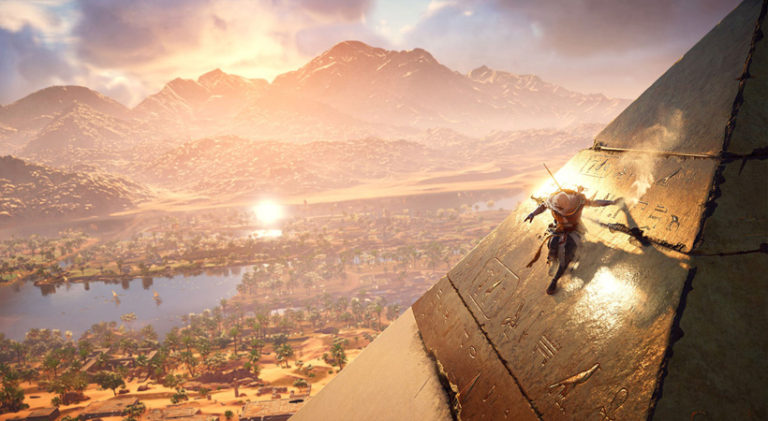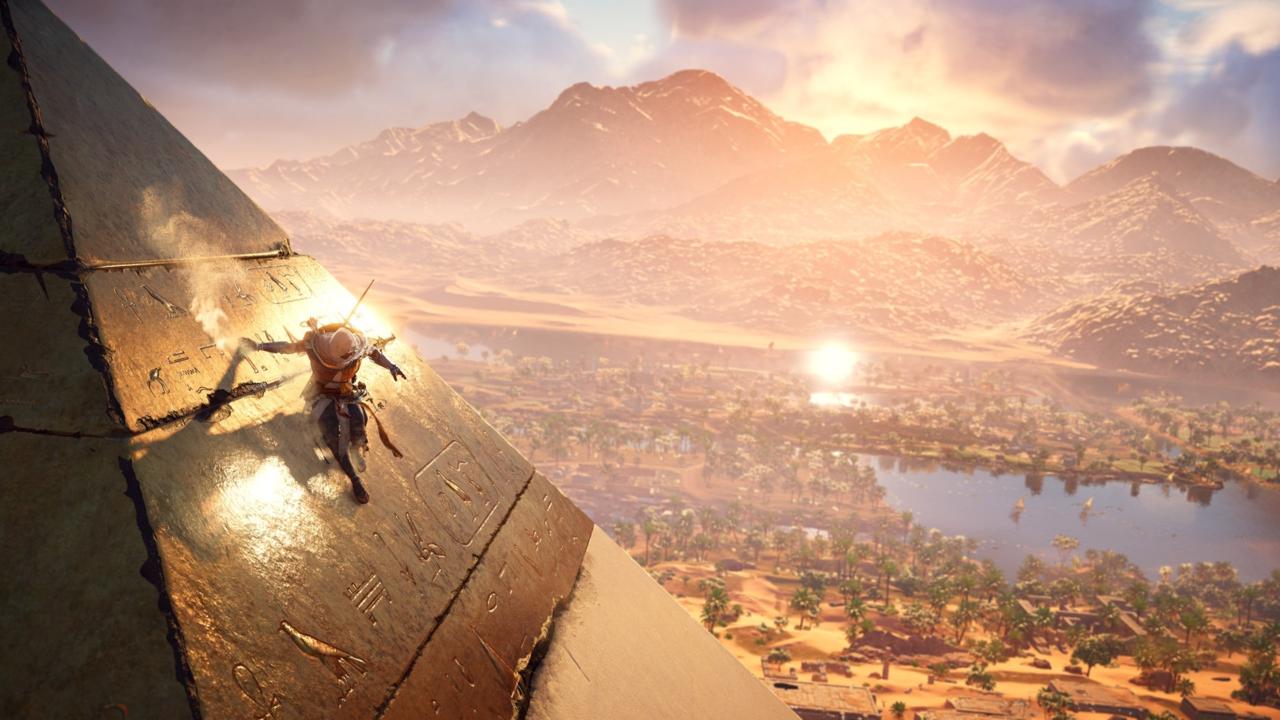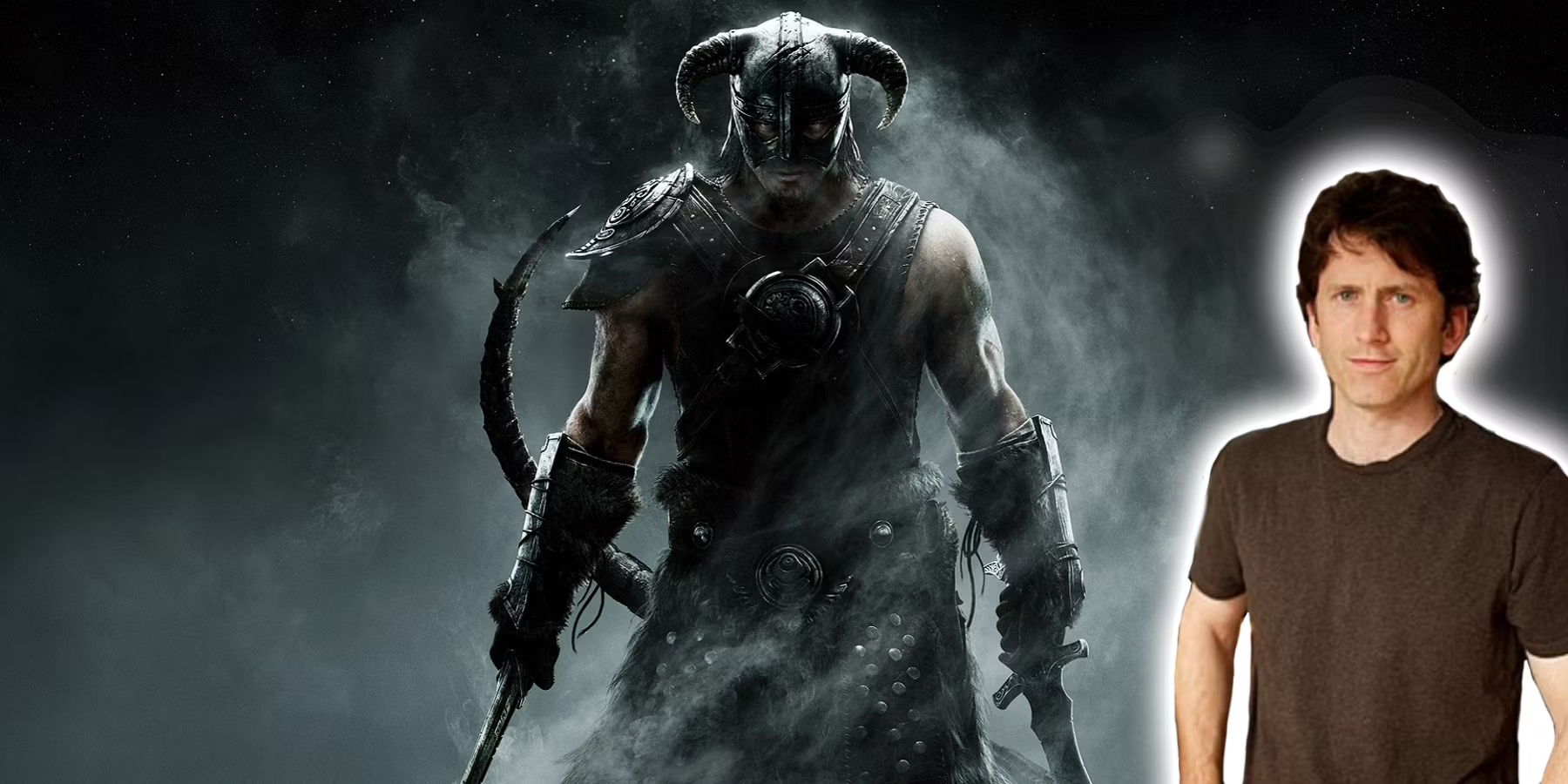For a series that came out just over a decade ago, it’s hard to imagine that there are already over ten games. That is one way we can describe the Assassin’s Creed series, although personally, I can’t say it’s entirely a bad thing. The fight between Assassins and Templars spans centuries as both sides use special machines to recollect stories of the past to locate powerful artifacts that could tip the scales in their favor. While the story in present time may have lost its relevance after Assassin’s Creed 3, the games themselves remain just as engaging as ever. Still, for a series that’s seen a yearly release for over about a decade, perhaps it was time for the formula to get an update.
So when Assassin’s Creed Origins came to E3, it definitely caught many fans off guard with the sudden changes to the game. It definitely felt different from other titles as the game off off from the familiar formula we’ve come to know. After a couple hours of game time, I caught on to how the game’s new mechanics and came to enjoy the game from start to finish. I might go back and play it again with the expansions before Assassin’s Creed Odyssey comes out later this year, but that’s besides the point. The big question to ask is if the changes to the formula made Origins worth it or if they should back to what they did before. Could it be that the new time we’re in and the places we visit help to justify these changes?
A Different Story For A Different Time
While we could talk about Bayek’s story, the bigger change to the story comes from the one happening in present time. There were plenty of new things done with Origins and story also saw a big change too. For those of you who have followed the series up to this point, you know they split the story into two parts so far. The first told the story of Desmond Miles and how he got dragged into this mess of Templars and Assassins before having to sacrifice himself to save the world on Doomsday. Not that engaging, but it was more than the second part that had you as a random person. Either you were a game tester when you are diving into memories, or an unnamed assassin helping to discover the location of artifacts before Templars. It was during this second part that some can argue that the story in the “Modern Age” was falling apart.


How will Layla affect the modern day plot from here going forward?
While we weren’t getting anywhere important, we got some new development in the form of Layla Hassan. She is a researcher at Abstergo’s Historical Research Division, put in charge of finding and retrieving an artifact in Egypt. During her search, though, she comes across a tomb containing the mummies of the Assassins we play as: Bayek and Aya. She dives in with her own Animus but soon get finds herself getting in too deep as Abstergo kills off her friend and attempt to axe her off. It feels like we are approaching the story from a different angle and that we could be following her and Desmond’s father as we could discover more in the next game. A nice change of pace from what we’ve had for the last decade.

No denying that this looks amazing.
While we have gone to many places in the Assassin’s Creed series, it is a safe bet to say Origins is one of the biggest places we’ve run through. While the seas of Assassin’s Creed 4 were vast, there is something special about running through Egypt and seeing the world in the B.C. years. Even if it is dry lands from one end to the other, there is still a lot of variety to each location we travel to that can range from giant sand dunes to luscious greenery. It was fun to run around populated areas and pick fights with guards in one moment and then climb pyramids out in the blistering sun in the next.
There was more to the world of Origins that just one giant city or a part of the world that felt barren. It struck a nice middle ground to allow for a variety of locations you can visit during the game. It wasn’t like in the third game where you are running around America and suddenly you’re out in the high seas. You could see the progression of where you went and, depending on which direction you travel to, you can see how areas around water thrive and prosper while drier locations may not be as populated or elaborate. You could honestly spend the whole day on a camel’s or horse’s back and just sightsee and take in the amount of work developers put into the scenery of this game. They wanted Egypt to stand out, and they succeeded.
The Origin Loot Game
So with all these weapons, bows and shields you can use, how do you collect them? Usually with other games, you would either buy them if you had enough gold or could unlock “the best” equipment through complicated side missions. It wasn’t too hard to tell which weapon was better, but Origins took the loot game to the next level with how you can collect better equipment. As you travel Egypt and get into fights, you can purchase better weapons for you or grab them off enemies you put down. It’s fun to try out new weapons now and then, but by the time you finish the game, you realize that you almost become a walking arms dealer.

You’ll have so much loot at the end that you won’t need to break out your wallet.
Not that getting new weapons is a bad thing, but when you get to a point where you get legendary weapons all the time, you wonder if they really are legendary if you have five at one time. It was because of the loot game I had no problem with micro-transactions in Origins since, unlike other games, you could earn those special weapons and items if you explored the world. Still, it got to a point where I had more weapons than I knew what to do with. It got to a point where I was dismantling or selling off each new weapon I found since some stats and skills on a few were too overpowered compared to simple drops. Unlike the other loot games though, loot in Origins wasn’t too bad. It allowed me to experiment with weapons in fights while ensuring that things weren’t too easy or difficult. Speaking of combat, let’s talk about that next.
Combat
If you are the person who got to play each game in the Assassin’s Creed series, you probably know there is a certain game play style the games have. Navigation is as important and mostly, Origins still has it. Perhaps though that the other important aspect of any Assassin’s Creed game is the combat. You can still take down enemies using the assassin’s blade, but there are still plenty of times you need to put up your dukes and throw down with enemy attackers. It is with this in mind though that you can say the game took a drastic change from previous entries. Gone were the days of simple attacks and parries as we said hello to a more complex combat system overhaul for both close and long range combat.
The combat has never been as in-depth as it is here.
Usually the character isn’t fighting unarmed. They are using their sword in hand and maybe some throwing knives, a bow, or a gun. Even if you weren’t using a sword, the controls were fairly the same. With Origins though, each weapon type behave differently in terms of attack strength, speed, and if a shield is usable or not. Still, you can say a spear has a better reach than a sword and shield or an axe can hit much harder. Not only that, but you can also equip a variety of bows to that can range from a sniper bow, to bows that almost operate like a machine gun or a shotgun. It takes getting used to, but overall, the combat in Origins made it stand out even more than in previous entries. Something to which will be fun to see for the upcoming Odyssey.
Action-RPG instead of just action?
Another thing that was a drastic change from previous titles was the idea how each game didn’t focus on the numbers much. You can get stronger weapons, but it wasn’t like enemies became a nightmare to deal with if you didn’t upgrade. Even with Syndicate levels didn’t spiral too far from control as combat was still engaging and getting an assassination kill was still a one shot. With Origins though, the change was drastic as the newest game in the series took a deep dive into RPG elements. How deep was this change? Well, if you try to sneak up on a powerful enemy to stab them with the assassin’s blade, they can shrug it off and turn their attention to you.
You got a spear through the chest, but you can walk it off, right guy?
Considering the setting of Origins and how this is the first game in the timeline, you can say the blade itself isn’t as effective as it was later on. It is also because of this that perhaps how the RPG elements would make sense here. To ensure that players do not rush through the game, different parts of Egypt have different levels to them. Not that this was a glaring issue either as it didn’t feel like you were getting cheated out if you followed the story. If things got too tough, do a side mission or two and level up. Earn better weapons with higher attack power so that enemies can drop faster. The progression in Origins feels just right as it always continues so that you can always improve your skills from start to finish.
Conclusion: Will Assassin’s Creed stay with this new formula?
That’s hard to say. Outside of Odyssey and maybe even an Assassin’s Creed game set in China or Japan, it may be difficult to continue to keep using this. It made sense we haven’t seen this in other games in the series due to the lack of a variety of weapons. It wasn’t like other games in the series would have found any benefit in the loot system like Origins did. The focus for the other titles wasn’t around combat was it was more about exploration and assassinations. You do those in Origins too, but the assassinations took a back seat so make way more a more in-depth combat system.
There are still plenty of things you can talk about with Origins and changes made to the game. Things like having Senu scout for you while you ride to your destination and underwater exploration were also fun additions to the game. Overall, Origins felt like it was a step in the right direction in terms of the series. Or at least in the sense of revitalizing it after using the same formula for as long as they have. There is nothing wrong with the old style of Assassin’s Creed games, but these changes were exactly what the series needed to keep things feel new than repetitious. Can’t wait to see what Assassin’s Creed Odyssey brings to the table when it comes out October 5.


Until then, I’m going to start practicing screaming, “Sparta!” every time my character gives the enemy the bottom of his foot.
So what do you think?
Did you like the changes in Assassin’s Creed Origins? Do you enjoy the gameplay in Origins more than the other games in the series? Leave your thoughts down below and be sure to follow us here at Culture of gaming.













